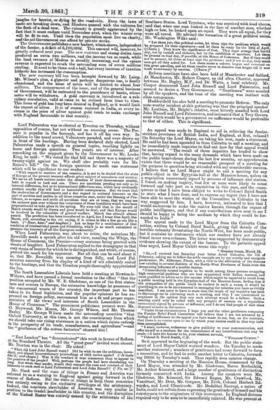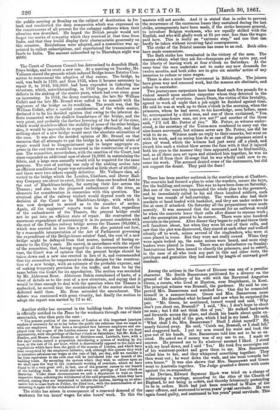An appeal was made to England to aid in relieving
the famine- stricken provinces of British India, and England, at first, refused! On Saturday the Lord Mayor, on taking his seat, made a statement. He said he had been appealed to from Calcutta to call a meeting, and he immediately made inquiries to find out how far that appeal would be answered. "The result of those inquiries has tended to show that, having regard to the many demands which have been made on the public benevolence during the last few months, an apprehension exists that there would he no reasonable prospect of a meeting for the purpose in question being attended with any eensiderable success. I believe that no Lord Mayor ought to call a meeting for any public object in the Egyptian-hall at the Mansion-house, unless on a requisition numerously signed by persons of influence and station. I found, on making inquiry, that few or none were likely to come forward and take part in a requisition in this case, and the eonse- quence is that I have been obliged to write to Colonel Baird Smith to state what I have done, and to express my regret that I have not been able to meet the wishes of the Committee in Calcutta in the way suggested by him. I have, however, intimated to him that I would endeavour to make the matter known through the organs of public intelligence, and that if any contributions were sent to me should be happy in being the medium by which they could be for- warded to India."
The appeal made to the Lord Mayor from the Calcutta Com- mittee, written by Colonel Baird Smith, giving full details of the horrible calamity devastating the North-West, has been made public, but it contains no statements which our readers have not already found inour own columns. The letter was supported by documentary evidence showing the exteut of the famine. To the pathetic appeal thus urged, Lord Mayor Culitt wrote this reply : " Mausion-house, March 23.
"Sir,—I received last Saturday your letter dated Calcutta, the 7th of February, asking me to follow the noble example set by my worthy and eoergetie predecessor, Mr. Alderman Finnis, with a view to the alleviation of the distress now existing in several districts of the North-West Provinces of India from the devastating influence of a terrible famine.
"I immediately ceased inquiries to be made among those persons occupying
high commercial positions Who are best acquainted with Indian matters, and most qualified to advise as to the success which might be expected to result from a public meeting held in the Egyptian-hall of the Mansion-house, feeling that if the sympathies of the public could be excited in such a cause, it would be gratifying to me to be instrumental in assuaging the miseries you have so vividly described. I am sorry to have to state that the result. of my inquiries has been to discourage me in convening such a meeting, and that I am constrained to acquiesce in the opinion that any such attempt would be a failure. Such a meeting could only be called with any prospect of success on a requisition numerously signed by persons of influence, and I do not Had people of that class disposed to move iu the matter. 'Dud& these circumstances I hope you and the other gentlemen composing the Famine Relief Fund Committee will believe that I am not actuated by a feeling of indifference to the appeal you have made to me, but, on the contrary, that there is no course open to me by which your desires could in that way have been accomplished.
"1 shall, however, endeavour to give publicity to your communication, and offer myself as a medium for the transmission of any contributions that may be made.—I have the honour to be, your obedient servant, "Colonel R. Baird Smith, Q.B. "Wthuast Ctoorr."
So it appeared in the beginning of the week. But the public state- ment of Lord Mayor Cubitt worked wonders. On Tuesday, he made another statement ; numbers of gentlemen had come forward to form a committee, and he had to write another letter to Calcutta, forward- ing 10001. by Tuesday's mail. Thus rapidly does opinion change. On Thursday a meeting at the Mansion House, summoned by the Lord Mayor, was attended by Mr. Gladstone' Baron Rothschild. Mr. Arthur Kinnaird, and a large number of gentlemen of distinction formerly connected with India. Among the speakers were Mr. Gladstone Mr. Kinnaircl, Sir Edward Regan, Mr. Crawford, Mr. Vansittar;, Mr. Dent, Mr. Gregson, Mr, Frith, Colonel Herbert Ed- wanks, and Lord Clanricarde. Mr. Dadebhai Naorogi, a native of India, could not refrain from expressing the gratitude of himself and his countrymen to the originators of this movement. In England distress required only to be seen to be immediately relieved. He was present at the public meeting at Bombay on the subject of destitution in Ire land, and recollected the deep compassion which was expressed on the countenances of all present for the unhappy sufferers when their situation was described. He hoped the British people would not forget the marks of sympathy which they received at that time from India, and that they would display their characteristic generosity on this occasion. Resolutions were aclopted,.and a committee was ap- pointed to collect subscriptions, and superintend the transmission of funds to India. The amount subscribed up to Thursdayn night was 4000/.































 Previous page
Previous page